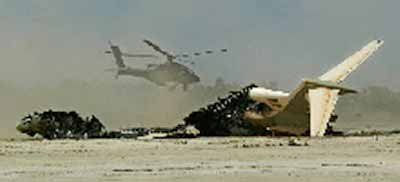Remaining in the north are units of both the Republican Guard and Iraq's regular army, McChrystal told a Pentagon briefing. "We have been targeting them aggressively," McChrystal said. He said it was possible that a large force loyal to Saddam was regrouping in Tikrit, Saddam's hometown and power base. "We are prepared to be very, very wary of what they may have and prepare for a big fight," McChrystal said. He said that, if necessary, U.S. Marine and Army units could be sent from Baghdad to Tikrit, which is about 100 miles north of the capital. McChrystal said U.S. commanders were trying to "judge their strength" to determine what air defenses the city's defenders may still have in place. "We're trying to take that down," he said. "It's hard to tell" exactly how many troops and military equipment Iraq has in the north, McChrystal said. "They have been significantly degraded...as time passes," he added. McChrystal also said that the Army's 4th Mechanized Infantry Division, which had originally been slated to enter Iraq from Turkey and form a northern front, was about to join the fray. The unit had to take a detour through the Suez Canal from the Mediterranean to Kuwait after the Turkish parliament blocked the United States from using its bases to attack Iraq. McChrystal said that despite the recent positive developments and the collapse of Saddam's regime, "the conflict is not over." "Since the Saddam statue was toppled yesterday, two United States servicemen were killed" and several dozen were injured, he noted. U.S. forces "continue to discover weapons caches and military equipment hidden and abandoned. Death squads still pose a threat," McChrystal said. He and Pentagon spokeswoman Victoria Clarke said they had no new information to impart on Saddam's fate or on the hunt for weapons of mass destruction. Work still continues on analyzing suspect substances, Clarke said. "It's a long process. Sometimes things test positive, then turn out negative. We are taking our time." Earlier, Defense Department officials said that Army and Marine forces that had been moving separately on the capital finally linked up to control all the routes in and out. Despite the fighting in the north, the main remaining threat to U.S. forces were the regime's roving paramilitary fighters in Baghdad, Pentagon officials said. Also on Thursday, America's Kurdish allies entered the northern city of Kirkuk. The extent of pro-Saddam resistance was unclear in the city, which is near some of the country's most productive oil fields. The United States is worried that Iraqis have wired explosives to wells and other facilities in oilfields in northern Iraq, ready to cause an environmental disaster. The U.S. military was flying a small number of tanks and armored personnel carriers into the north of Iraq to be able to launch more ground operations in a part of the country coming in for greater focus now that the organized resistance in the capital has completely collapsed. The new ground forces, coming from Europe, will link up with the 173rd Airborne Brigade. While the main invasion force has moved into Iraq from its southern neighbor Kuwait, forces for the northern front were mostly airlifted into the country after Turkey refused base rights for Americans. The northern front has consisted of special operations forces, working with local Kurdish militia and supported by coalition air strikes. Secretary of Defense Donald H.Rumsfeld on Wednesday listed the missions in Iraq that must still be completed "before victory can be declared." They included: -Discovering more about how Saddam built his weapons programs and locate Iraqi scientists with knowledge of them. He said U.S. government rewards were being offered to further those goals. -Capturing or killing terrorists still operating in Iraq. -Finding members of Saddam's Baath Party and their records and weapons caches. Also, locate records of the Iraqi intelligence service and other security organizations and paramilitaries. -Working with Iraqis, including those returning from exile, to establish an interim government authority.
|
